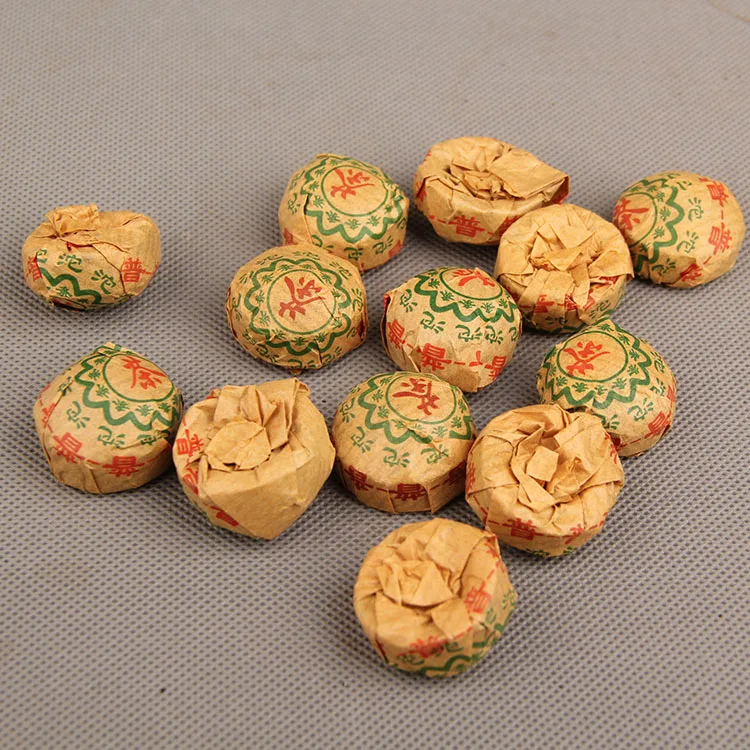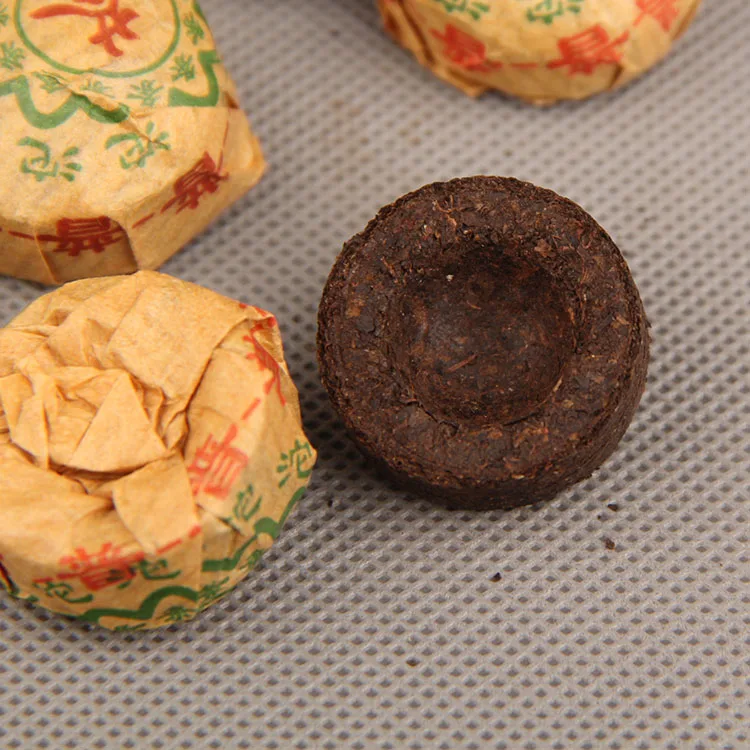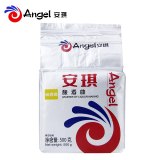Specifics:
Origin: Yunnan, China
Tea Type: Ripe/Cooked/Shu Puerh
Flavours: Original
Net Weight: About 3-5g per piece
Expired Date: Long Time in Storage conditions
Storage Conditions: Clean, Ventilating, Lucifuge, Dry, No Srange Smell And Pollution
ABOUT PU'ER TEA
Pu-erh tea, also spelled as Pu'er tea, is a variety of fermented dark tea produced in Yunnan province, China. Fermentation is a tea production style in which the tea leaves undergo microbial fermentation and oxidation after they are dried and rolled. This process is a Chinese specialty and produces tea known as Hei Cha, commonly translated to dark, or black tea (this type of tea is completely different from what in West is known as "black tea", which in China is called "red tea"). The most famous variety of this category of tea is Pu-erh from Yunnan Province, named after the trading post for dark tea during imperial China.
Pu'er traditionally begins as a raw product known as "rough" Mao Cha and can be sold in this form or pressed into a number of shapes and sold as "raw" Sheng Cha . Both of these forms then undergo the complex process of gradual fermentation and maturation with time. The recently developed Wo Dui process pioneered by both the Menghai and Kunming Tea Factories has created a new type of pu-erh tea of which some traditionalists dispute the legitimacy. This process involves an accelerated fermentation into "ripe" Shou Cha which is then sold loose or pressed in various shapes. All types or pu-erh can be stored for maturity before consumption and that is why it has become common for the products to be labelled with year and region of production.
Puerh is a large leafed tea from the Yunnan province in China and has been famous as a medicinal tea. The earliest records of Puerh tea date back to the Tang Dynasty ( 618AD-906AD ) when it was the favorite tea of the nobleman of this time. Puerh tea over the centuries has been used as a form of currency in China and an important international trading item.
Puerh tea derives its name from the market town of Pu-er, where it was originally processed and sold. It is said that the unique taste of Puerh Tea was developed because it took weeks to transport the tea leaves by horseback to the town to be processed. During this transportation period the tea leaves would begin to ferment in the humidity and release a strong, fragrant aroma, which people found quite pleasant. A special technique of tea fermenting developed and Pu'er was thus created.
FEATURE & BREWING GUIDE
The secret of making Puerh tea has been closely guarded in China for centuries. The tea leaves are collected from growers of a special broad-leaf tea tree, which are said to be related to ancient prehistoric tea trees. The leaves go through two types of fermentation, which gives this tea its unique characteristics; a mild, but distinctively earthy flavour. Puerh teas are much like fine wines, which become smoother and more balanced with age. Puerh teas are much lower in tannins than other teas due to the special processing method which it undergoes.
Brewing Puerh Tea:
To make tea must control the water temperature, which greatly effect the aroma and tasty of the tea soup.
Pu'er Tea requests the boiled water of the 95 Celsius Degree - 100 Celsius Degree.
How much tea can depend on personal taste, generally, 3-5 grams tea properly with 150 milliliters water, and the proportion of tea to water between 1:50-1:30.
For the tea purer aroma, it is necessary to warm tea, i.e., pour out the boiled water immediately for the first time, which can have 1 - 2 times.
The speed must be quick so that the taste of the tea soup can be prevented from influence. While really starting, about a minute the tea soup can be poured into the public cup, and then continue the second. With more times, the time can be prolonged slowly, from 1 minute to a few minutes gradually, which can keep the even density of tea soup.










No related record found